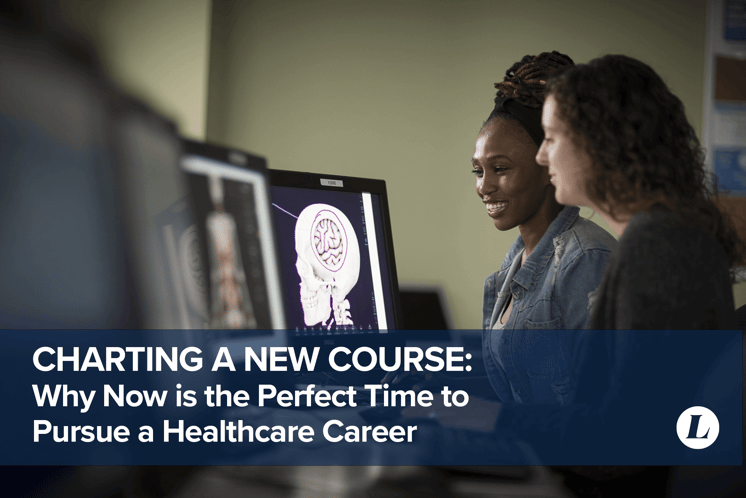Top 10 Healthcare Careers in 2024
The healthcare industry is booming, and there is high demand for qualified healthcare professionals. Learn how to get started in a healthcare career today.
Embarking on a healthcare career is a smart move. According to the U.S. Bureau of Labor Statistics (BLS), one out of every six new jobs created through 2032 will likely be in the healthcare industry.
As you explore the healthcare field, you will encounter over 250 different healthcare professions.
How do you choose which career is best for you?
Career planning can be stressful, but Labouré College of Healthcare is here to help.
Read on for four tips for choosing the best healthcare career. And because we know that growth is good, we will provide a few options for taking your career to the next level and leveraging your education for lateral moves within healthcare.
Now that you have thought about why you want to work in healthcare and what kind of environment you would like to work in, take one or more of the career quizzes listed below.
Compare the results of the quizzes to see if you spot a trend. If two out of three quizzes suggest that a nursing career may be a good fit for you, take the next step and talk to some nurses about what they do.
If you do not know anyone to talk to, contact a healthcare college to ask if they can set up one or two phone interviews with graduates of the program. Ask about their education, daily schedule, and what they like and do not like about their job.
Program costs will vary, but typically a longer program will cost more than a shorter course of study. However, when searching for an educational program consider what factors will affect your final cost.
The final cost of your program can be influenced by any financial aid you qualify for, whether you choose a program that is in-state, out-of-state, online, or in-person, and whether you have to move to attend the program.
Now we will look at ten healthcare careers, covering direct patient care roles, jobs for those who might enjoy performing diagnostic tests, and administrative careers. We will also show you which careers to consider if you want to start working within a few months to a year, and which careers require a degree before you can start working.
Nursing careers are in demand. Licensed practical (LPN) and vocational nurse jobs ranked #66 on the 2024 U.S. News and World Report Best Jobs List. If you want to become a registered nurse, starting your nursing career as an LPN is a great entry point that does not require a degree.
After completing a one-year program LPNs enjoy good career prospects, with the number of job openings anticipated to grow 5 percent annually through 2032.
If you wish to continue your education after becoming an LPN, many associate degree programs allow you to complete their RN program while working. With a two-year degree, you will be eligible to sit for the NCLEX-RN and continue your nursing career as a registered nurse (RN), another of the most in-demand healthcare professions of 2024.
If you are not interested in a nursing career, consider becoming a medical assistant, another of the top in-demand healthcare occupations of 2024.
You can earn a medical assistant certificate in one year. Medical assistants (MAs) are in demand and are expected to enjoy a 14 percent yearly job growth rate through 2032.
As a medical assistant, you will have many options to continue your education. With some experience, you can test for additional certifications or transfer your program credits to a degree program. And since MAs work both front and back office positions, future education plans can include clinical paths (nursing or other healthcare programs) or administrative paths (healthcare administration).
Other fast-entry direct patient care healthcare careers include:
Electrocardiogram (EKG) technicians record the heart’s electrical impulses through electrodes attached to a patient’s skin. EKG techs are in demand, with an expected job growth rate of 10 percent through 2032, much higher than average.
Become eligible to take the national EKG certification exam after four months of training with Labouré’s EKG certificate program.
The seven college credits earned through Labouré's program can be applied toward a college degree. So if you love working in healthcare, you can continue your education with an associate's degree or move into a different healthcare career.
If the human brain and nervous system fascinate you, neurodiagnostic technology might be a great career choice for you.
Learn to monitor and record the electrical activity of the brain, spinal cord, and peripheral nervous system in as little as 12 months. Labouré offers a program that can qualify you to become a registered EEG technician. As a neurodiagnostic technologist, your job prospects are good, with a higher-than-average predicted job growth rate.
The human nervous system is complex. As you gain experience in the field, you can specialize and test for additional certifications that show employers and patients that you are committed to ongoing education and providing quality care to patients.
Other Fast-Entry Testing and Monitoring Careers:
As one of the top in-demand healthcare careers of 2024, respiratory therapy is a great career choice for students who can commit to a two-year associate’s degree. With a degree, you will qualify to become a certified or registered respiratory therapist.
Job growth potential is excellent, with experts predicting a 13 percent increase in employment through 2032. If you continue your education through at least the bachelor’s level, you may qualify for positions that pay more, including in management.
Whether you work your way up from a practical nurse license or attend a two or four-year degree program, as a registered nurse you will experience flexibility in your nursing career.
The job prospects for RNs are good at a predicted 6 percent growth rate through 2032. If you want to continue your education after becoming an RN, many RN-to-BSN programs allow you to work while going to school.
If being an RN isn’t enough, reach for a bachelor’s, master’s, or doctorate and join the ranks of nurse practitioners - the best job in 2024, according to the U.S. News and World Report - or go into research or education.
Other Degreed Direct Patient Care Careers:
You will need to be okay with blood, fluid, and tissue samples, but if working in a laboratory all day appeals to you, this career may be one to consider.
With a two-year associate degree in clinical laboratory science, you can have a career with good job prospects (faster job growth than the national average) and room for further education.
A bachelor's degree can qualify you for a job as a clinical laboratory technologist where you will perform more complex lab testing. Specialty certifications can open doors to higher-paying positions and more responsibilities, such as laboratory management jobs.
Radiologic technologists work in many different settings, including hospitals, provider offices, and radiology centers. The job growth outlook for radiologic technologists is higher than average at 5 percent.
With an associate degree in radiologic technology and some experience, radiologic technologists can obtain a bachelor’s degree in a related field. Higher education can lead to an increase in pay or help with a move to a different healthcare career.
Radiologic technologists can also seek additional certifications, such as MRI technologist certification, making them more valuable to employers.
Other testing and monitoring careers that require a degree:
If you can see yourself helping run a healthcare business, consider obtaining a bachelor’s degree in healthcare administration.
Healthcare administration is a rapidly growing field with great potential for the right person. The U.S. Bureau of Labor Statistics projects that healthcare administration will see a job growth rate of 28 percent annually through 2032.
Some positions require a healthcare background, but many do not. So if you want to work in healthcare but are not interested in working directly with patients, consider lending your business talents to the running of a facility, office, or unit.
A two-year associate degree in health science can qualify you for many administrative jobs but can also be the beginning of an educational pathway.
Labouré’s health science program allows you to take classes toward a concentration, such as medical administrative assistant, EKG technician, or phlebotomy (one of the top in-demand healthcare careers of 2024).
Healthcare support occupations, including health science jobs, are expected to grow 15 percent through 2032.
Continue your health science education with a bachelor’s degree to open the door to more opportunities and a larger paycheck.
Other healthcare careers that require a college degree:
Labouré College of Healthcare is here to help you make the right career decision. Speak with an admissions counselor today to discuss your healthcare career options.
Check out the links below for more help with healthcare career planning:

The healthcare industry is booming, and there is high demand for qualified healthcare professionals. Learn how to get started in a healthcare career today.

Discover why now is the perfect time to pursue a healthcare career. Explore job security, satisfaction, and career advancement in the healthcare industry.

Discover 8 reasons to pursue an Associate of Science in Health Science: diverse career options, high demand for professionals, and quick completion.
© 2024 Labouré College of Healthcare. All Rights Reserved.
Comments